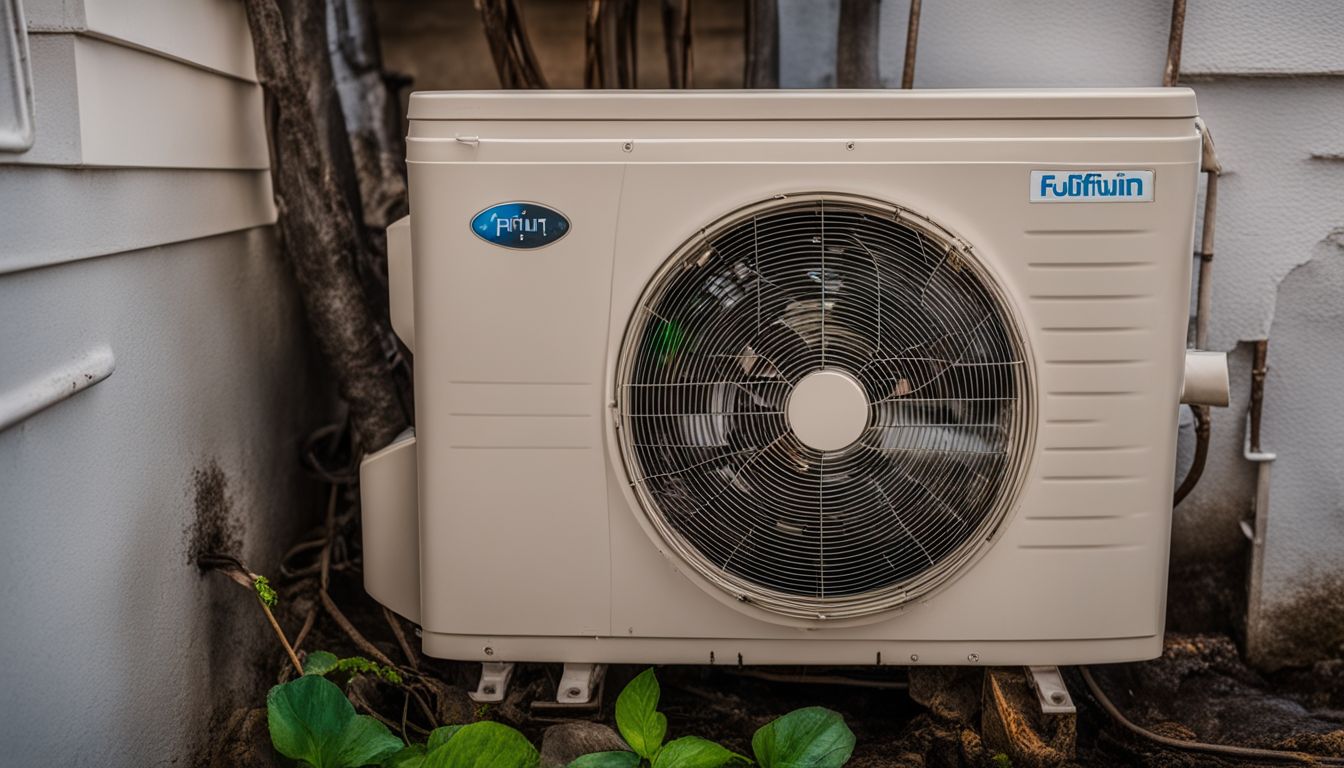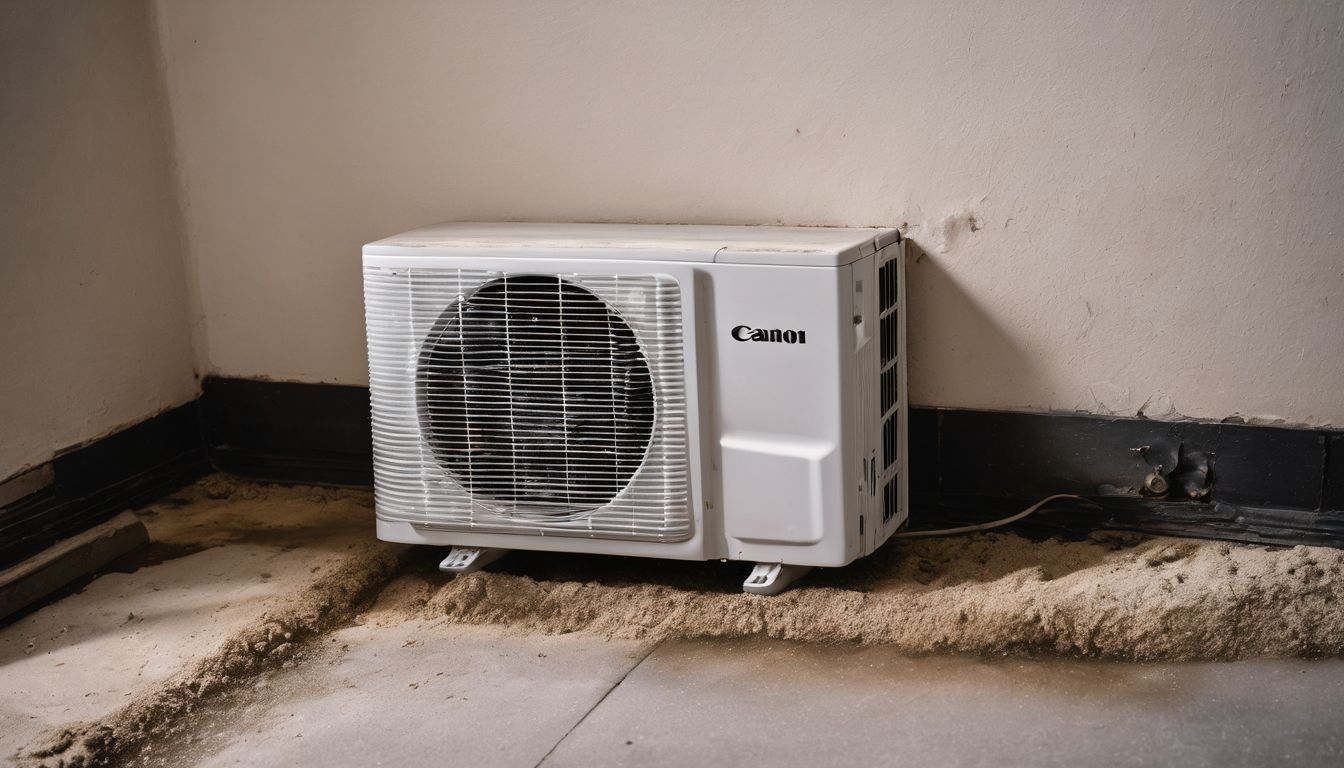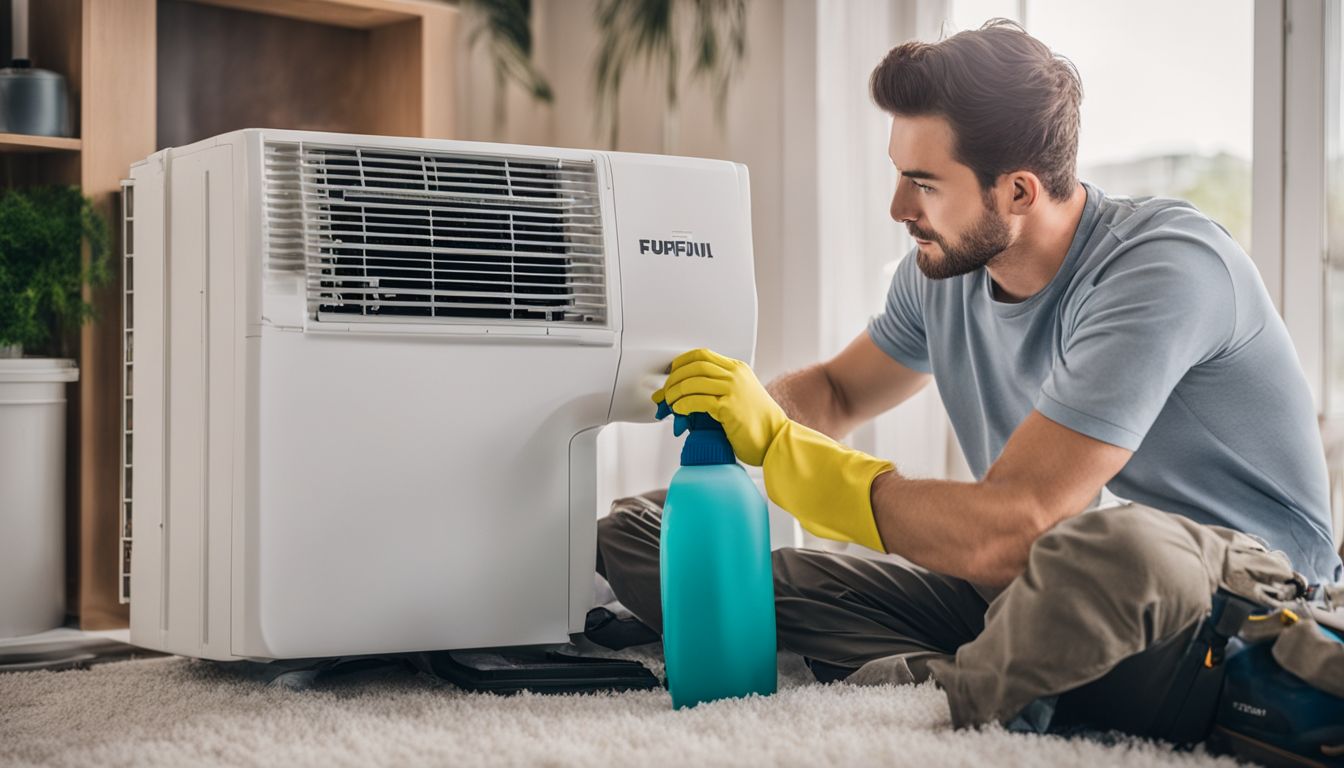Unpleasant smells from your air conditioner can turn a cosy home into an uncomfortable space. A musty whiff each time the AC kicks in is often a cry for help from your unit. Our article will guide you through the most common scents and their sneaky sources, teaching you how to banish them for good.
Keep reading to clear the air!
Common Unpleasant Odours from Air Conditioners
Air conditioners are a haven for various odours, each indicating unique issues within the system. From the disconcerting scent of exhaust to the dampness of mould, these smells can be telltale signs that your cooling unit needs attention.
Exhaust-like Smell
An exhaust-like smell from your air conditioning system can be alarming and suggest a serious issue. If you notice this odour, it’s often a sign that fluids within the engine are burning or that there is an electrical problem.
Car engines and home HVAC systems share some similarities; leaks within the heating components of your HVAC equipment can produce odours resembling exhaust fumes. These smells could indicate overheating in parts like the fan motor or circuit board, which require immediate attention.
Prompt action is essential to prevent potential health hazards associated with these types of odours. Don’t ignore an exhaust-like scent, thinking it will disappear on its own—it won’t and it shouldn’t be present at all in well-functioning systems.
Be vigilant for accompanying symptoms such as strange noises or inefficient cooling, which may accompany the bad smell. Contacting professionals skilled in air conditioning repair should be your next step to ensure indoor air quality isn’t compromised by contaminants that mimic noxious exhaust fumes.
Fire or Burning Smell
If your air conditioner emits a burning smell, it might mean trouble. Overheating components or electrical problems often cause these odours and can indicate a serious risk. Electrical parts getting too hot within the unit could burn out without prompt attention, leading to potential hazards.
The scent of something burning should never be ignored as it points to issues that require immediate investigation.
Regular checks on air filters and system maintenance can prevent such concerns from developing in your heating and cooling appliances. Air conditioning units sometimes experience worn-out fan belts or bearings, filthy filters, faulty capacitors, and other electrical malfunctions that produce this alarming odour.
It’s essential to contact HVAC professionals who can safely diagnose and fix any overheating or electrical faults before they escalate into more severe problems with larger consequences for your home comfort systems.
Rotten Egg Smell
The rotten egg smell from your air conditioner can set off alarm bells. This odour usually means gas is seeping into the system, and it’s not something to shrug at. Methyl mercaptan, a component of natural gas with that distinct foul scent, could point towards a hazardous gas leak.
You should act swiftly if this happens in your home. Shut down the central air conditioning unit immediately and contact professionals who are trained to handle such emergencies. These experts will check for leaks around evaporator coils or connections where gases might escape.
It’s crucial not to attempt fixing this alone because of the potential dangers involved, including exposure to carbon monoxide or other toxic substances that could mix with the circulated air in your living space.
Skunk-like Smell
A skunk-like smell wafting through your home from the air conditioner is a red flag that should not be ignored. This pungent scent could mean there’s a gas leak, often involving methyl mercaptan, which shares similarities with the odour of a skunk’s spray.
Ductwork can act as a conduit for this gas, spreading the stench throughout the house and potentially endangering those inside.
If you catch even a hint of this unmistakable aroma, it’s critical to act swiftly. Shut down your HVAC system immediately and call in professionals to investigate. A qualified technician will inspect for leaks and ensure that hazardous gases like natural gas or refrigerants are contained before they cause harm or discomfort.
Ignoring these warning signs isn’t just about dealing with an unpleasant odour—it’s also about keeping everyone safe from potential gas exposure risks.
Moldy or Musty Smell
Moldy or musty smells from an air conditioner are often the result of excessive moisture and water accumulation in components like drip lines, drain pans, or ducts. This can create a perfect breeding ground for mould and mildew to thrive.
Dirty air filters compound the problem by trapping moisture and debris, which only adds to the stale scent circulating through your home.
To tackle this issue head-on, ensuring proper ventilation in your living space is critical. Checking the AC’s drainage system for blockages will help prevent water buildup that leads to these odours.
Regularly replacing or cleaning your air filters also plays a vital role in stopping mould from settling into your AC system. Keep humidity levels under control with a dehumidifier to maintain a fresher atmosphere free of that damp odour associated with mould growth.
Cigarette Smoke Smell
The lingering odour of cigarette smoke can be a persistent problem in homes with smokers. As the smoke drifts, the particles and chemicals are drawn into the air conditioning unit where they cling to the condenser coil and air filters.
This absorption process makes it possible for stale tobacco smells to infiltrate a central air conditioner system, which then recirculates this unwelcome scent every time the unit is turned on.
Eliminating cigarette smell demands targeted action such as replacing contaminated air filters and cleaning the coils with solutions like white vinegar that do not mask but neutralise odours.
Regularly switching out old filters and scheduling HVAC maintenance can help keep your indoor air fresh. For stubborn cases, consider installing an electrostatic filter or using an air purifier specifically designed to remove airborne allergens and irritants including traces of cigarette smoke from your living spaces.
Causes of Unpleasant Odours in Air Conditioners
The emergence of foul smells from your air conditioner can signal underlying issues ranging from simple maintenance oversights to serious health hazards. Determining the root cause is essential for restoring fresh, clean air and ensuring the system’s safe operation.
Refrigerant Leaks
Refrigerant leaks in air conditioners are a serious issue that can lead to some rather nasty smells circulating through your home. These odours might remind you of rotting garbage or give off a sulfuric, rotten egg scent, signalling that the cooling agent from your AC is escaping into the atmosphere.
Not only do these leaks cause your air conditioner to run inefficiently, but they also release chemicals that could potentially harm your indoor air quality.
Spotting a leak early is crucial for maintaining performance and safety within an air-conditioned space. Aircons rely on chlorofluorocarbon or similar substances to cool the air; when these refrigerants escape, they can cause irritation or more severe health effects if inhaled over time.
Homeowners should be vigilant for any unusual odours and consider professional inspection as this could indicate a breach in their system’s integrity. Regular checks ensure all components function correctly without leaking harmful fumes into living areas.
Improper Drainage and Moisture Build-up
Clogged drain lines in your air conditioner can spell trouble by creating a perfect environment for mould and mildew to thrive. This problem often leads to a musty or “dirty sock syndrome” smell as bacteria grows unchecked due to the standing water.
Dirt and grime build-up cause these blockages, preventing water from draining properly, which contributes to a stale and unpleasant odour circulating throughout your space.
Regular cleaning of the AC’s drainage system is crucial for preventing moisture from lingering inside the unit. Without proper attention, this excess humidity not only causes foul smells but could also result in significant water damage over time.
Keeping components such as drain pans and condensation lines clear prevents bacteria and mould growth, ensuring your living areas remain fresh and free of odour-causing microbes.
Overheating and Electrical Malfunctions
Overheating and electrical malfunctions in your air conditioner can lead to unpleasant smells that signal danger. An overheated motor or faulty circuit board, common culprits behind these odours, require immediate attention to prevent further damage or potential safety hazards.
If you detect a burning aroma emanating from your AC unit, it’s essential to switch off the system promptly and seek professional help.
Electrical issues within air conditioners create risks for fires and cause significant mechanical problems that worsen over time if left unchecked. Routine checks on electrical components should be part of your regular maintenance to ensure all wiring is intact and operating safely.
It helps avoid situations where heaters or heat pumps emit scents of smouldering parts due to neglected care.
Identifying and Addressing Air Conditioner Condensation: Reasons and Solutions

Condensation in air conditioners often stems from clogged condensate drains or a buildup of stagnant water. These issues create the perfect breeding ground for bacteria, mould, and mildew, which contribute to that familiar musty smell sometimes called ‘dirty sock syndrome.’ Regular checks can prevent moisture accumulation by ensuring clear drainage systems work effectively.
Solving this wet problem includes cleaning out blocked drains and replacing parts where mould has taken root. If you notice your unit is more like a mini swamp than an AC, it’s time to act.
Clearing filters regularly keeps the air flowing smoothly and removes unwanted odours. Additionally, consider installing electrostatic filters to trap dirt before it causes trouble inside your system’s workings.
Moisture control is key; keeping components dry will maintain fresh-smelling air throughout your space.
Solutions to Eliminate Unpleasant Odours
Tackling foul aromas from your AC unit need not be a daunting task; with the right approach, fresh air can once again prevail in your home. Implementing thorough cleans and routine checks are pivotal steps towards banishing those stubborn scents for good.
Regular Cleaning and Maintenance
Regular cleaning and maintenance of air conditioning units are crucial in keeping bad odours at bay. Over time, dust and debris can clog filters, hindering airflow and creating a breeding ground for bacteria.
Swapping out dirty filters not only freshens the air but also extends the life of your AC. Coils gather moisture and if not cleaned regularly, can produce a mouldy smell that permeates through your home.
Staying on top of moisture levels prevents mould and mildew from setting up shop in your system. Ensure ducts remain free from blockages to keep musty scents away from your living space.
Professional duct cleaning might be necessary to tackle tough build-ups inside the ductwork that contribute to smelly issues. Keeping components like p-traps clear ensures water flows properly, avoiding a backup of sewer gases into your home’s ambience.
By investing time in preventive care for your AC unit, you avoid larger problems down the line caused by neglecting simple upkeep tasks such as cleaning coils or emptying drip pans that collect excess water—simple steps with significant impact on indoor air quality.
Proper Ventilation
Ensuring proper ventilation in your space can significantly improve air quality and prevent the accumulation of unpleasant odours from your air conditioner. Stale air trapped inside can become a breeding ground for smells; hence, allowing fresh air to circulate effectively dilutes and displaces these odours.
Install exhaust fans in key areas such as kitchens and bathrooms where moisture accumulates or ensure that vents are clear to enhance airflow.
Addressing the root causes of bad smells often includes evaluating how well-ventilated your environment is. Use ceiling fans or open windows regularly to aid in circulating indoor air, helping it stay fresher for longer periods.
For optimal results, consider integrating an energy recovery ventilator (ERV) system with your ACs, which exchanges stale, recirculated indoor air with fresh outdoor air without losing cooling power.
This action helps maintain a pleasant atmosphere while keeping energy costs down by recycling already cooled or heated air.
Professional Inspection for Leaks and Electrical Issues
Calling a professional to inspect your air conditioner can be crucial for sniffing out leaks and electrical issues that often escape the untrained eye. Technicians use specialised tools to detect refrigerant leaks, which are not only harmful to the environment but can also cause that dreaded skunk smell or scent of rotten eggs when chemicals mix with certain odours.
They ensure all connections are secure, looking out for any signs of wear and tear that could lead to bigger problems down the line.
Electrical malfunctions within your air conditioning unit may result in overheating, contributing to a fire or burning smell. A qualified technician will check for faulty wiring damaged components, and confirm whether your system is operating safely.
Regular maintenance includes cleaning filters and checking drainage systems to prevent mildewy scents caused by excess moisture build-up. By addressing these potential hazards early on, you can keep your home safe from unpleasant smells as well as carbon monoxide risks associated with improper AC functioning.
Conclusion
In tackling unpleasant smells from air conditioners, staying vigilant is key. Act fast to diagnose the root cause and apply targeted solutions. Consistent maintenance ensures your unit remains odour-free and efficient.
Embrace fresh, clean air by addressing these common AC issues promptly. Remember, a fresh-smelling home starts with a well-cared-for air conditioner.
Explore our comprehensive guide here for a deeper understanding of how to tackle issues with your air conditioner’s condensation.
FAQs
1. Why does my air conditioner (AC) smell bad?
Your AC might smell bad due to reasons like a dirty filter, water heater issues, or because it’s absorbing odours from activities like smoking in the area.
2. Can an air purifier help with unpleasant odours from my air conditioner?
Yes, using an air purification system can help remove smelly particles and improve the quality of the air coming from your air conditioner.
3. What should I do if I suspect a natural gas leak near my AC unit?
If you detect a scent similar to rotten eggs or smelly feet around your stovetop or AC unit, evacuate immediately and call for professional help since this could indicate a dangerous natural gas leak.
4. How can I prevent odours from affecting my home’s comfort?
Regular maintenance of your AC filtering system and installing carbon monoxide detectors where needed are key steps in ensuring odourless and safe air circulation within your home.





